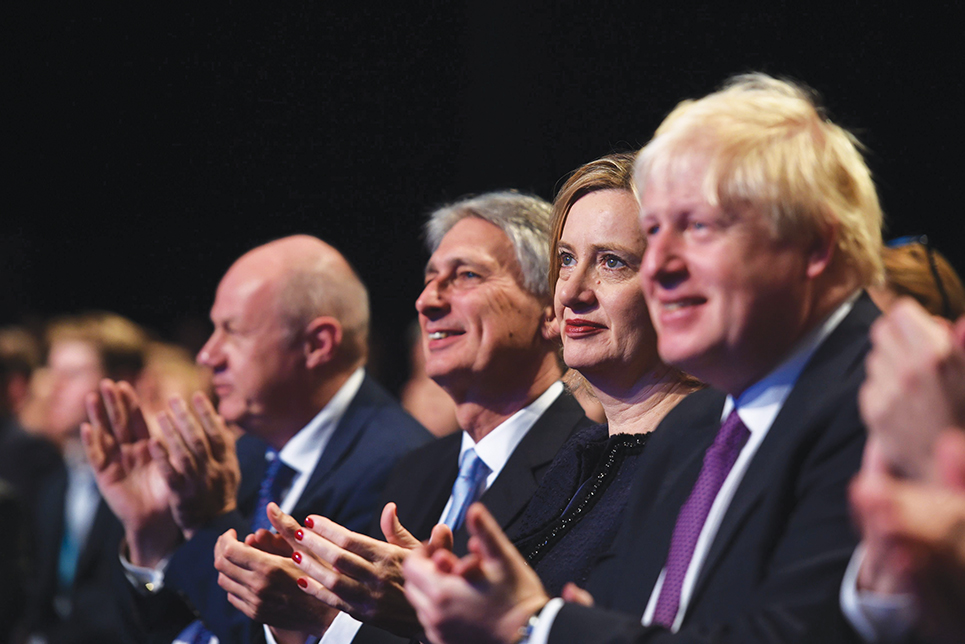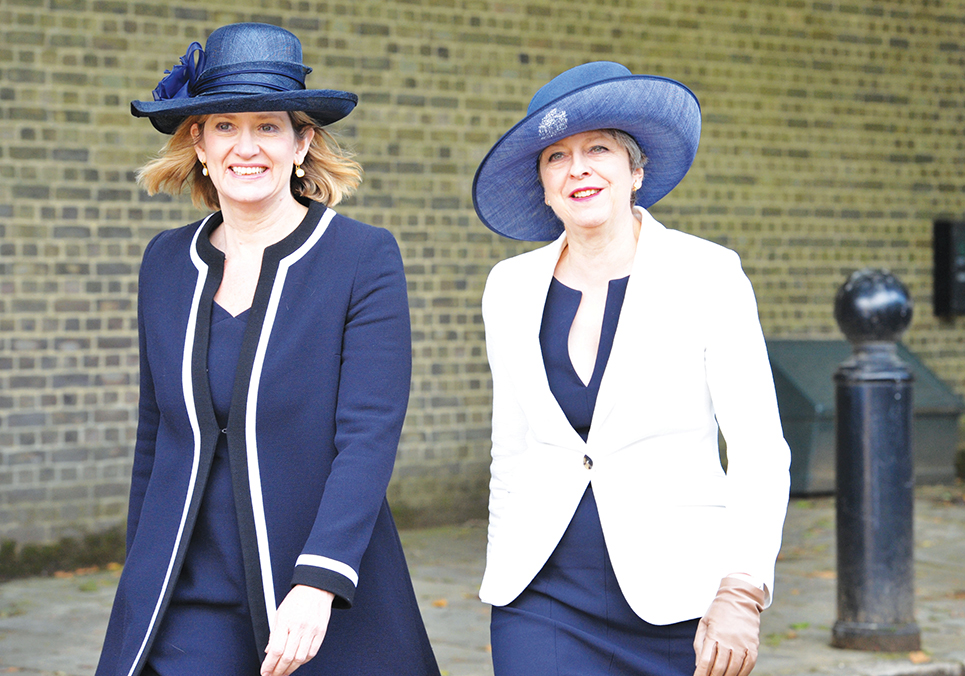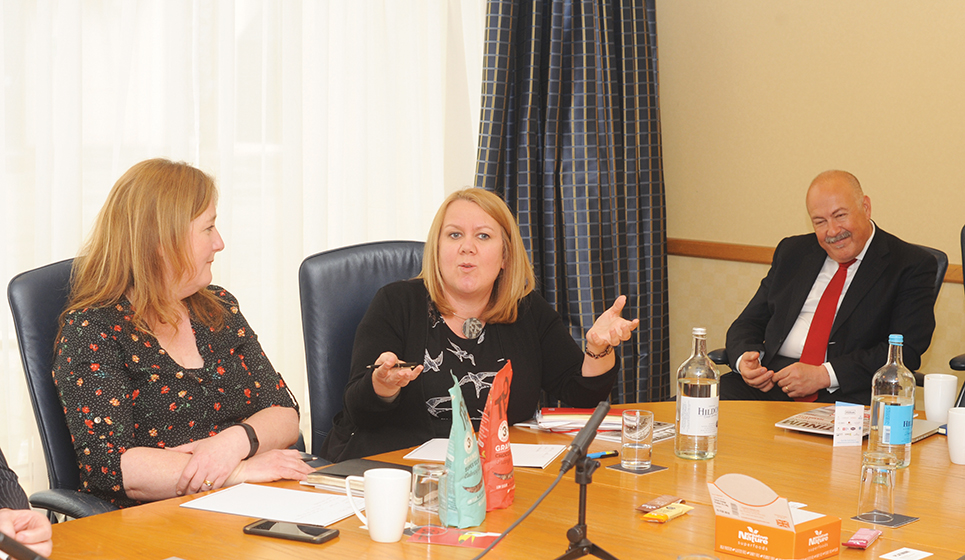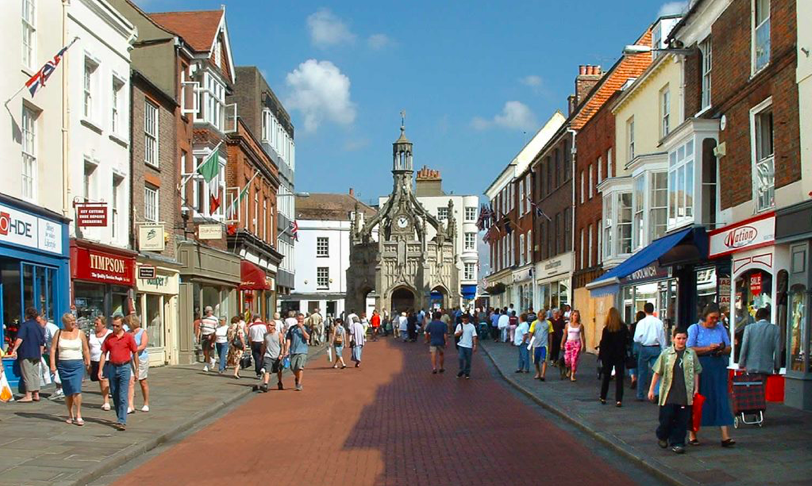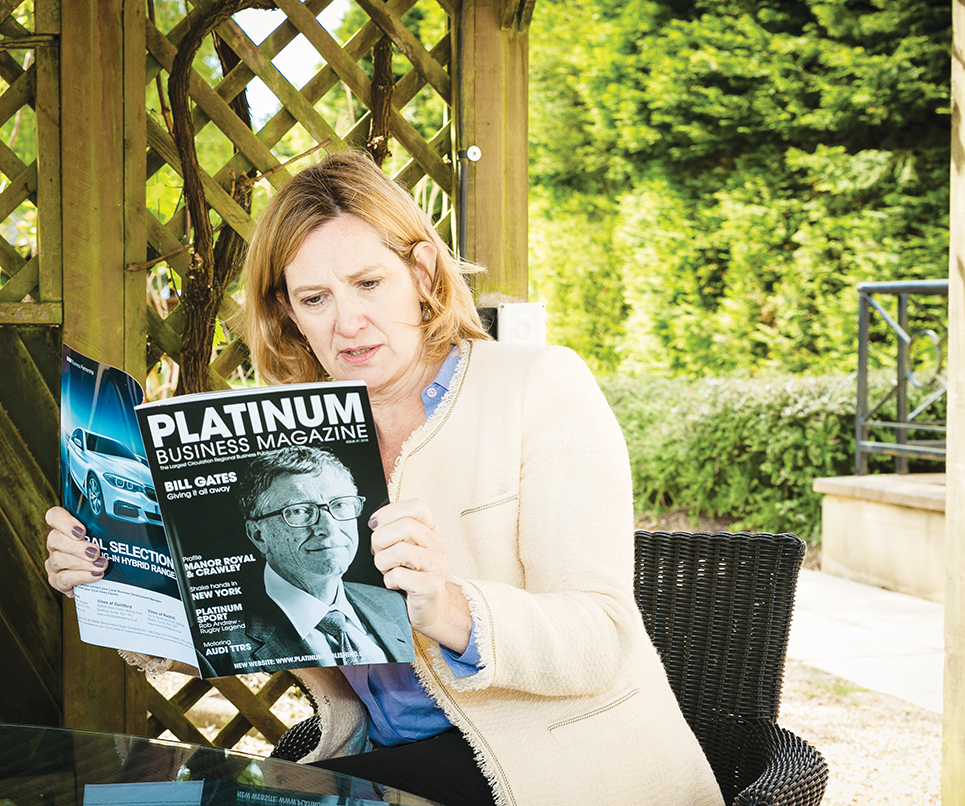
It would be fair to say that 2018 hasn’t entirely gone to plan for the MP for Hastings and Rye. It had all been going so well. Her political rise was swift and dramatic. She only entered Parliament in 2010 but after just six years she held one of the Great Offices of State (the four most senior and prestigious posts in the British government), and was only the fifth woman to do so. Amber was the fastest-rising politician to a Great Office of State since the Second World War.
She was tipped to go even further. The Economist recounted her warm reception at the influential conservative think-tank, the Centre for Policy Studies (CPS): “She represented a link between the establishment and the new generation. Ideologically, she represented a unifying force in a divided party. Here was Margaret Thatcher’s favourite think-tank championing the leader of the Remain faction in the cabinet. Lord Saatchi, the CPS’s chairman, introduced Ms Rudd by reading a list of five home secretaries who had gone on to become prime minister.”
Amber Rudd may indeed become the sixth on Lord Saatchi’s list, but it may take longer than anticipated. Once the awful treatment of some of the children of the Windrush generation came to light, her opponents sensed blood. The policy of creating a ‘hostile environment’ was not introduced by Amber, but by Theresa May, the previous Home Secretary. However it was the question of how much she knew about targets for enforcing the removal of ‘illegal’ immigrants that cost her dear.
On April 29th 2018, when she resigned as Home Secretary, her letter of resignation stated that she had “inadvertently misled the Home Affairs Select Committee on the issue of illegal immigration”.
But Amber Rudd is a fighter, and refuses to keep a low profile. Less than three weeks later she was the guest speaker at a Future of Work conference organised by the RSE recruitment group, and she happily agreed to be interviewed by Platinum Business Magazine (although, unsurprisingly there were a few questions we were told not to ask!)
Still a Remainer?
Amber Rudd was often perceived as the dedicated Remainer in the cabinet who acted as a bulwark against those who sought the hardest of Brexits. After all, she probably had the killer line in the referendum debate, when she referred to her Brexit opponent Boris Johnson as being: “Not the man you want to drive you home at the end of the evening.” She may well have continued the fight behind the closed doors of the government’s inner circle, but she certainly won’t be drawn on such matters in a press interview.
A query on her thoughts on Brexit was swiftly brushed aside with a bullish prediction of opportunities that will greet the UK over the coming years, and she is robustly confident on our chances to succeed.
“A strong area of growth I see for the UK is in luxury goods and brand goods,” says Amber. “The amount of growth that Burberry has seen over the past few years has largely been in China. Brand Britain is an enormous asset to us and luxury products the UK can promote and sell overseas are of huge value.
“I went to a local business centre recently and saw a small business which puts together beautiful sets of sound equipment which are being sent out internationally. It’s the kind of thing you could buy digitally for a quarter of the price but their clients don’t want that. They wanted a beautiful product with a beautiful veneer on the top and they were prepared to pay a premium for that. This is something that we in Britain do very well.
“I am always interested in finding out what more we should do as a government to support businesses. How we can get out of the way but ensure that we’ve got the right regulation in place.”
Regulation is a positive thing
Regulation is a theme that crops up regularly in the conversation with Amber and for her, it is a very positive thing. Businesses often complain about over-zealous regulation but it she is adamant that done well, strong regulation is actually an asset:
“I know that regulation is always a challenging area but if we get our regulation ahead of other countries in terms of autonomous cars, advances on airlines and other new innovations, then we will be the place that people will want to come and set up their businesses.
“One of the reasons why the UK became a centre for financial services over the past 15-20 years is because we have a regulatory system that has the right balance between regulating the financial services and protecting individuals. Being able to stay ahead has meant we continued to thrive in our financial services.
“GDPR coming in is a good thing for the EU and the UK when you consider what happened with Cambridge Analytica and the Facebook data. We are going to be able to say with confidence to people internationally: ‘Your data will be secure here’.
“The wealth of the country is not just about trade. Strong rule of law and proper regulation is what attracts businesses to this country. They know that it is a safe place to do business. If we can stay ahead in regulating new areas of work we will attract the best talent and businesses.”
Terrorism and the Internet
The theme of law and order crops up in the conversation regularly and when asked about her proudest achievement as Home Secretary, Amber has no hesitation in highlighting the work she did with the internet giants to significantly reduce the online propaganda churned out by terrorist groups.
“Last year when I was Home Secretary we encountered a series of terrorist attacks that really knocked us,” says Amber. “One of the responses I had was to call together the largest internet companies and say: “You need to do more to take the terrorist material offline.” I went out to Silicon Valley, went to the big boys out there, Google, Apple, Facebook. I got them all together and they did set up a global internet forum for counterterrorism and they do take down that material now. We estimate that 97% of potential terrorist material is taken down by them automatically.
“So much information, data, business is done through social media over the internet. They don’t quite know how to regulate it in my view. Only twenty years ago Facebook didn’t even exist. I think all companies are struggling to regulate and get that balance right.
“In the area of counterterrorism, I eyeballed the Silicon Valley chief executives and they felt a terrific responsibility for making sure that their site wasn’t the one that was used for terrorism. We must continue to do that and push them harder.
“It isn’t easy, and the answer isn’t as simple as just banning it. The Germans got an agreement where if they emailed the internet companies about a site, they have to take it down within 24 hours. But that’s too late. It is believed that within 90 minutes any terrorist material released would have been circulated round the world. It has to be on the basis of getting the internet companies to engage with us. There are 400 hours of YouTube put up every minute. When you think of the scale of that the only way to be able to get them to actually regulate their own sites is to invest themselves in the sort of artificial intelligence and the knowledge that will enable us to be sure that it won’t be put up in the first place. It has already been done successfully with child pornography which has been virtually wiped out from the open web.”
The theme of the conference was the future of work and this is a subject that Amber Rudd is particularly passionate about.
“Before I went into politics, I was in the high-risk world of venture capital and my ten years there taught me enormous respect for people who set up businesses. I know the huge feeling of risk and anxiety that goes with actually putting yourself on the line, taking responsibility for employees and I always want to make sure that this government will respect that and will help to support employers. Helping small businesses set up, getting out of the way so that we can allow them to grow and making sure that we have the right educational support going forward is absolutely critical.
“There are substantial grants and tax reliefs for start-ups and growing businesses. There’s also support of high street shops in terms of business rates. We’re very committed as a government to make sure we support the small businesses and to make sure they’re able to raise money. We know how important that is in terms of expansion, so we’re very supportive in making sure that the market is out there so that they can raise money. Small businesses become large businesses and they are the employers of the future.”
Hastings & Rye
The support of small businesses is particularly relevant in her own constituency. While the South East’s economy has boomed, Hastings has struggled with lower wages and higher unemployment than the rest of the region. It is also one of the most marginal constituencies in the country. At the last election the Conservative majority was a wafer-thin 346. Unsurprisingly, when I asked what’s next for Amber Rudd, her answer was unequivocal: “It’s all about Hastings and Rye”. It is firmly at the top of Labour’s hit-list. Ousting a former Home Secretary is not quite as spectacular as kicking out the serving Minister, but it would still be met with celebratory glee by Labour supporters. Spending more time in the constituency may not be a bad thing for Amber.
It is a mystery to me how a politician can serve one of the highest offices of state, dealing with all the problems the country faces, yet still have time to look after the everyday issues that are so important to individual constituents. For Amber this is actually a positive thing. “When politicians from other countries find out that we are still local MPs as well as Ministers they think we are mad! I believe we have the system right. By holding constituency surgeries we get to talk to people and hear their issues and views. If you get too far removed, it can be dangerous as you create policies which seem to be sensible, but we don’t always understand how it affects people in their everyday lives. It also keeps us grounded. I wouldn’t change it.”
Even so, with such a tiny majority, engaging more locally may be a silver lining, and Amber is keen to talk about how the Hastings economy is changing for the better. “It is absolutely changing,” she says. “There is a much more of an optimistic feel about the town than there has been for a long time. Unemployment has fallen dramatically. It is still higher than most of the South East but it is far lower than it was in 2010.
“We’ve been able to grow the economy. There is confidence in the area. There has been visible investment in the infrastructure in the area. We have started the dualling of the A21 which is fantastic and I’m committed to getting faster trains.
“Hastings has benefitted from some great projects and was chosen to be of twelve Opportunity Areas which included £6m of direct grants to improve outcomes for over 11,000 children and young people in Hastings.
“A lot of money has been going into Hastings to try and improve the schools, give the teachers what they want, give the additional leadership, invest in the buildings. It has improved, but it hasn’t made that systemic change that we’re all looking for. I hope that this can be that change. My experience sitting in with the Opportunity Area board yesterday (May 17th) is that we are on the cusp of achieving just that. The Secretary for Education, Damian Hinds, was at the meeting, as it is taken very seriously at government level.
“I think the opportunity area for Hastings and Rye could be a fantastic push forward for improving our educational opportunities. Unemployment in Hastings and Rye has fallen by 50% since 2010 and I’m told 400 new businesses have set up since then. Several employers I’ve spoken to at this Future of Work Conference have said to me they find it hard to find the right people to come and join them. The way to address that is to make sure that our skills are better and I think the opportunity area will make a really important step in achieving that.”
As well as promoting small businesses, Amber is particularly dedicated to eradicating gender imbalances in the job market. She says: “We all know one of the areas that is going to grow is artificial intelligence. We have to make sure that more women get involved at an earlier stage in the subjects that are going to be relevant to allow them to excel in that. When I went over to Silicon Valley I noticed there are plenty of women in Google and Facebook at the top, but there were very, very few engineers. As a overnment, we have to make sure we do as much as possible to encourage young women, even when they’re still at school, to choose the STEM subjects that are going to be so critical to getting on in that area of future growth. As a former Minister for Women and Equality I was very much keen on championing this.”
The Future of Work conference included extensive debates on artificial intelligence, so will there be a day when AI replaces politicians?
“No! I think not. Politicians have to be accountable and for that you need a human being not a machine. Someone has to engage with people and being out and about with people is critical. The personality of a politician means they will always be needed.”
Clearly the chances of Amber Rudd being replaced by a machine is just as unlikely as her giving up on her political career without a fight.
--
Future of Work 2025
We interviewed Amber Rudd MP during a break at the Future of Work 2025 conference organised by the RSE Group, and held at Bannatyne Spa Hotel in Hastings. Amber was speaking at the conference, which was introduced by Mandy Brook, Managing Director of RSE.
The other speakers were:
Tom Hadley from the Recruitment & Employment Confederation, which is the professional body for the UK recruitment industry.
Rob McCargow from PwC UK, who sits on the All-Party Parliamentary Group on AI.
Adam Jeacock, Head of Sales & Marketing at Smith & Ouzman, a leading security and financial printer
Maria Paviour, who has developed an index which measures well-being and emotional engagement at work
Thanks to Sarah Bennett for the photography from the conference



